Introduction
- Require multi disciplinary/ multimodal support through out their life span
- Includes:
- Medical care involving various departments (Pediatrics, Pediatric Neurology, Psychiatry, Ophthalmology, ENT, Orthopedics, Dentistry etc.)
- Supportive Role by Clinical Psychologist, physiotherapist, occupational therapist, Dietician, speech therapist etc.
- Under one roof / umbrella approach is ideal in such patients
Co-Morbidities
- Intellectual disability/ Hyperactivity/ Inattention/ Obsessive/ compulsive symptoms
- Sleep Disorders
- Epilepsy
- GI disturbances (GERD/ Constipation)
- Associated difficulties with physiological pubertal changes
Intellectual Disability
- 40% of eight-year-old children with ASD identified through the Autism and Developmental Disabilities Monitoring Network had IQ ≤70 or examiner-reported intellectual disability
- Needs to be taken into account when teaching these children the social and language skills
MMWR Surveill Summ. 2012, 61:1
Epilepsy
- Comorbid epilepsy 5-38%
- Bimodal incidence of epilepsy
- Infancy to age 5
- Adolescence (>10 years)
Rossi PG et al. Brain Develop. 1995;17:169-74
Tuchmanand Rapiin. Lancet Neurol. 2002;1:352-58
Daniiellsson S et al. Epilepsia. 2005; 46: 918-23
- Cumulative probability of epilepsy
- Autism alone
- 2% at 5 years
- 8% at 10 years
- Autism with severe mental retardation (MR)/ ID
- 7% at 1 year
- 16% at 5 years
- 27% at 10years
- Autism with MR and cerebral palsy (CP)
- 20% at 1 year
- 35% at 5 years
- 67% at 10years
Tuchman and Rapin. Lancet Neurol. 2002; 1:352-8
- Epilepsy persists into adulthood
- Remission in 16%
Danielsson S et al . Epilepsia 2005; 46:918-23
- 10 year follow up (n=30)
- 25% epileptic seizures
- 68% epileptiform EEG prior to seizure onset
- Epileptic group
- Lower IQ
- Lower social maturity score
- ↑frequency of psychotropic medication treatment
Suitable AEDs
Hara H. Brain Dev. 200 7;29:486-90
Sleep
- Sleep difficulties
- 56-68%
- Up to 89% if past is included
- Disturbances include
- Difficulty in sleep initiation
- Difficulty in sleep maintenance
- Irregular sleep-wake pattern
Wiggs L and Stores G. J Intell Dis Res. 1996;40:518-28
Hoshiino Y et al. Folia Psychiatricaet Neurologiica Japonica. 1984:38:45-51
- Disturbance and severity of symptoms
- Fewer hours of sleep predicted
- ↑autism scores
- Social skills deficits
- Stereotypic behavior predicted by
- Fewer hours of sleep
- Screaming during night
- Predicted communication problems
- ↑sensitivity to environmental stimuli in bedroom
- Screaming at night
Schreck KA et al. Research Dev Dis. 2004; 255:57-66
| Table 3. The Poportion of ASD Children with Abnormalities on Polysomnography |
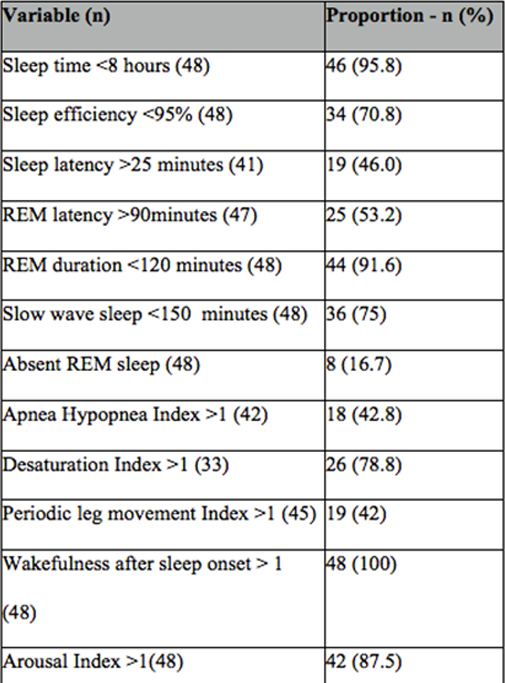
REM - Rapid Eye Movement, ASD: Autism Spectrum Disorder
Unpublished data Gulati S et al
- Prevalence of sleep problems=77%
- Most evident sleep problems in ASD children were
- Bedtime resistance
- Parasomnias
- Daytime sleepiness
- Sleep anxiety
Unpublished data Gulati S et al
Sleep Disturbances
Follow Bed Time Routines
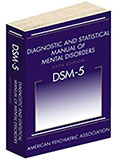
Use Picture Cards for Sleep
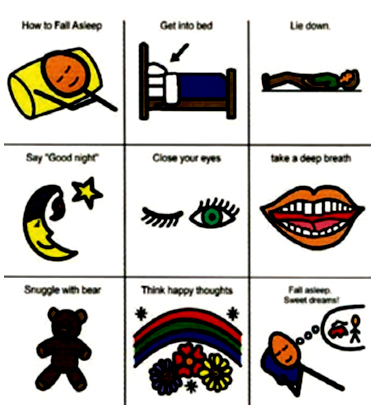
Follow Proper Sleep Hygiene
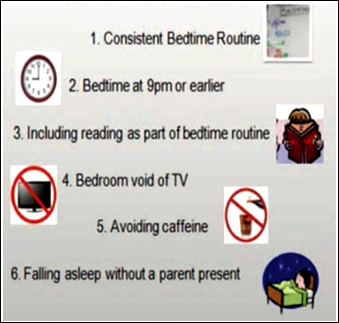
- Melatonin
- Up to 3 mg at bedtime shown to improve sleep rhythm
- Meta-analysis of five randomized, double-blind, placebo-controlled crossover trials examining exogenous melatonin supplementation in ASD
- Improvement in total sleep duration and sleep onset latency compared to both baseline and placebo
- Better daytime behaviors
- Optimum dosing and time of administration for best results being studied
Rossignol DA and Frye RE. Curr Clin Pharmacol. 2014;9(4):326-34.
GI Symptoms
- GI symptoms
- 52% of ASD vs 7% age-matched healthy siblings (p<0.001)
- ASD with irritability more likely with reflux eosphagitis
- 43% with GERD vs 17% without GERD
Horvath K and Perman JA. Curr Gastroenterol Rep. 2002 Jun;4(3):251-8
GI Discomfort and ASD
- Vocal Behaviors
- Throat clearing, swallowing, tics, etc.
- Screaming, sobbing for unknown reason, sighing, whining, moaning, groaning
- Delayed echolalia-repeating what may have been asked of them in the past
- Child saying “DOES YOUR TUMMY HURT?”
- Direct verbalizations
- Child saying “tummy hurts”, etc. with/ without pointing
GI Discomfort: Diagnostic Considerations
- Sleep disturbance
- Self-injurious behavior, tantrums, aggression, oppositional behavior
- Constipation
- GERD
- Gastritis
- Intestinal inflammation
- Chronic diarrhea (≥3 loose stools daily for >2 weeks)
- Malabsorption
- Maldigestion
- Straining to pass stool, hard or infrequent stool
- Perceived abdominal discomfort
- Constipation
- GERD
- Intestinal inflammation
- Malabsorption
- Maldigestion
Horvath K and Perman JA. Curr Gastroenterol Rep. 2002 Jun;4(3):251-8
Adolescence and Issues
Expected Behavior in Adolescence
- Irritability may increase
- Moody and arrogant
- More non communicative
- Attention span may decrease
- More insistence on sameness and orderliness
- May have onset of seizures
- Pubertal changes may cause distress
Autism: A Blessing During Teenage?
- No peer pressure
- No demanding nature
- Most adolescent develop awareness that they are different, that will motivate them to learn special skills
- Special skills develop
- Generally do not develop bad habits like smoking or drinking
Guidance for Adolescence
- Teach about personal hygiene and self care skills
- Encourage individual sports rather than team sports
- Menstrual hygiene should be taught
- Picture cards can be useful
Picture Cards for Pubertal Changes
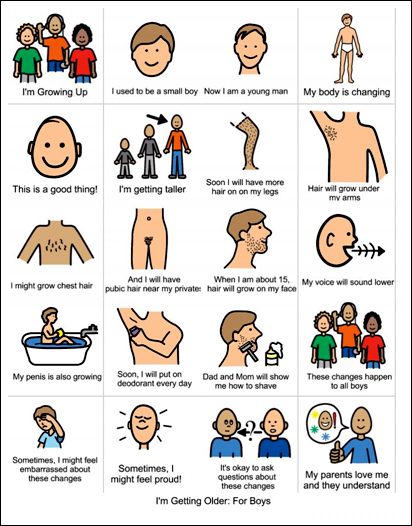
Sexuality and Menstrual Issues
- Girls may be stressed during periods of menstruation
- Vulnerable to sexual abuse
- May develop tendency to masturbate
- Self injurious behavior may increase
Menstruation
- Start talking early about periods
- You can use the social stories like the one given here
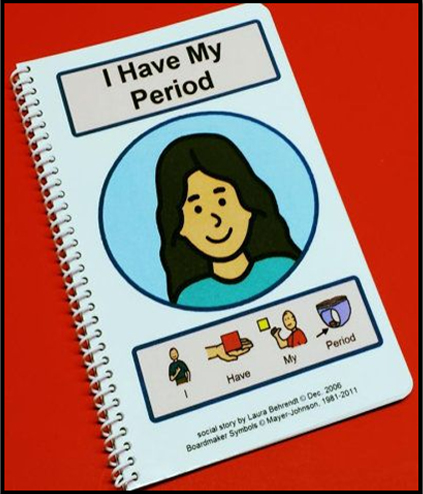
Social Story for "Periods"
- As my body changes I will get my period
- A period is also known as menstruation
- Most women have a period every 28 days. Sometimes it might be sooner or later. This is OK.
- When I get my period, blood comes out through my vagina
- A few days before I get my period, I might feel more upset about things. I might feel angry, I might feel sad, I might feel frustrated, or I might feel other emotion
- My breasts, stomach and the lower part of my back might feel sore at this time. This is normal
- I might have my period for 4-7 days. It might be shorter. This is OK
- I will need to use a cloth, pad or tampon so my clothes don't get stained
Abolition of
Menstruation in Severely Autistic Kids |
| Medical options |
Surgical options |
| Depo-provera injections |
Mirena insertion |
| Continuous combined oral contraceptive pills |
Endometrial ablation |
| GnRH analogues |
Hysterectomy |
| Oral Progesterone |
|
Sexual Behavioral Problems in ASD
- Touching private body parts
- Removing clothes in public
- Masturbating in public areas
- Touching others inappropriately
- Discussing inappropriate sexual subjects
- Obscene gestures
- Inappropriate remarks and suggestions that have sexual connotations
- Echolalic repetition of sexual terms
Masturbation in Adolescents
- If child is masturbating in front of others responses such as “ You have found that feels good but I would like you to wait until nap time or when you are at home in privacy”
- Provide a child with other ways to comfort themselves such as carrying a cuddle toy, manipulating clay or other sensory materials
- Aim to interrupt the behavior without showing emotional reaction
- Redirect the child to an activity that is incompatible with masturbation
- Ensure that the child’s clothes are comfortable and not too tight, too loose or twisted in order to avoid the child’s attention to the genital area
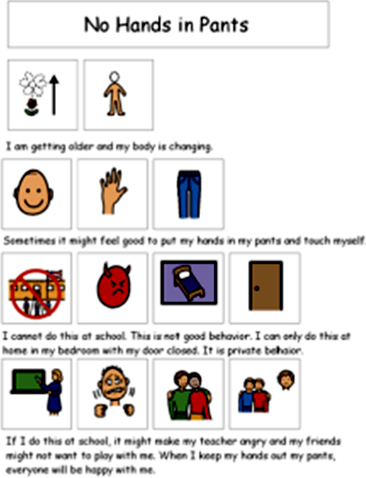
Adulthood and Autism
Adulthood and Autism
- Transition from childhood to adolescent to adulthood can create excitement as well as nervousness in individuals with autism
- Parental support and advance preparation can make them comfortable
The story of Donald Gary Triplett

First child diagnosed with autism by Leo Kanner, faced many challenges, but with his bachelor`s degree and later worked in a bank
Road Map to Adulthood
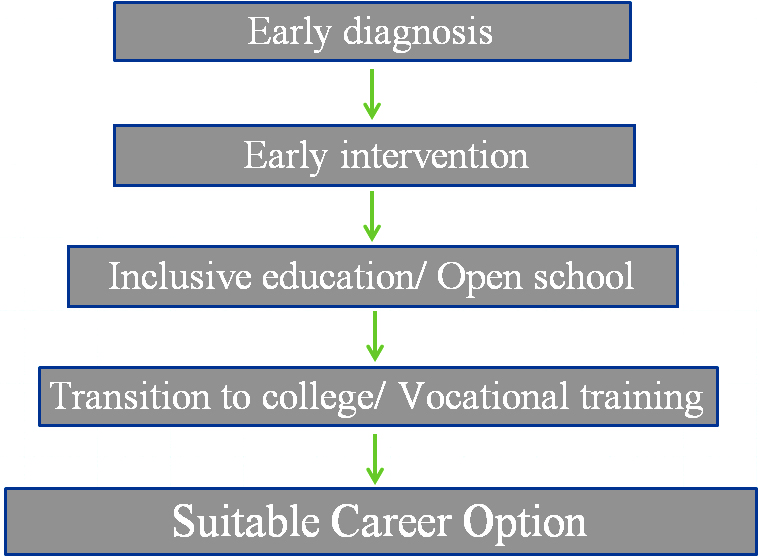
Problems Faced at High School
- Teachers and support staff not adequately trained; unaware of entity
- Inconsistencies – different teachers, different rules and timings, school and home environment
- Easy target for bullying
Problems Faced by Autistic Persons in Professional Arena
- Inadequate language development
- Poor social interaction
- Sensory overload
- Uncomfortable in crowd
Transition to College/ Vocational Training
- Understanding your child's abilities for autonomy
- Teaching self-advocacy
- Explore other post-secondary options
- Special colleges designed for persons with autism and other disabilities
- Start by visiting a nearby college
- Familiarize with a campus atmosphere
- Include time for lunch in the cafeteria
“Autism” an Asset for Some Career Options
- Information technology
- Scientists
- Creative works (Designer, artists)
- Banking and commerce
- Assistants
- Musician
Careers less Suitable for Autistic Adults
- Teaching
- Hospitality
- Sales and marketing
- Beautician
Conclusion
- Treat the patient and not the disease
- Don’t forget the co-morbidities while treating these children
Thank You








